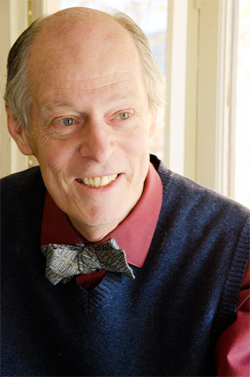
Professor Rod Macdonald’s deeply personal approach to legal education has earned him the University’s highest recognition for excellence in teaching: the Lifetime Achievement Award for Leadership in Learning. Focus online takes a look at the contributions Macdonald has made to the Faculty of Law and beyond.
To gauge the impact Professor Rod Macdonald has on the students he teaches, one can learn a great deal simply by sampling the comments that students submit in their course evaluations:
“Prof. Macdonald is da bomb,” reads one. “He knows this; we know this. It ain’t even necessary to repeat it.”
“BEST WEB-CT USE BY A PROF EVER IN THE HISTORY OF MANKIND!!” proclaims another, going on to add, “Yes, I checked the whole of human history before writing that, compare generally at: all profs need to learn from Prof. Macdonald.”
Glowing student evaluations are not unusual at the Faculty of Law, where, in 2010, two of the University’s four awards for teaching excellence went to Law professors.
But such comments reveal a capacity for self-reflection combined with an incisive sense of humour that are among the hallmarks of Macdonald’s teaching philosophy and that distinguish him as the 2011 recipient of McGill’s highest teaching honour, the Lifetime Achievement Award for Leadership in Learning.
The award recognizes contributions and innovations in teaching that are both long-term and truly outstanding and Macdonald’s qualifications in this regard are numerous: over three decades, he has ushered in an era of thorough bilingualism at McGill Law, worked to re-orient the Faculty’s curriculum towards the integrated Common and Civil Law program for which it is now renowned, and presided over the Law Reform Commission of Canada as it examined the goals of legal education from 1997-2000.

Macdonald emphasizes that teaching and learning opportunities are ubiquitous and often take place outside of the classroom: these can include unexpected or often begrudged aspects of the teaching life, such as writing reference letters, supervising theses or going over a course syllabus.
“Reference writing is a pedagogical moment where teaching/learning can occur in some of the most intense interactions,” he says, adding that in writing almost 200 letters of reference a year, he always sends a draft of the letter to the student who requested it, with the idea that the letter’s description of the student’s strengths and weaknesses induce further discussion.
Likewise, “course syllabi are crucial moments of teaching,” he argues, “because they are the occasion to first engage students in the process of reflecting on proposed course objectives, and their own contributions to iterating these objectives.”
To Macdonald, every human interaction is an Aristotelian opportunity to examine the virtues and values of those interactions. The ultimate goal of teaching and learning, by extension, is to better guide each individual – student and professor alike – in reflecting on one basic question.
“The only choice that really matters,” he says, “is the choice we make about the kind of person we aspire to be.”
During his tenure as Dean from 1984 to 1989, Macdonald made a point of hanging photos of women law graduates around the Faculty, because all the photos on the walls prior to that were of “dead white men.”
He earned such a reputation for it that when his deanship ended, John Durnford presented him with a framed painting of a voluptuously naked Eve, fig leaves strategically placed, with the caption: “Eve, the first woman to not graduate from Law at McGill.”
In Macdonald’s course on administrative process, students form negotiating teams to argue opposing sides of a human rights commission case. The teams conduct their negotiations via messages on WebCT and the interactions can become rather heated.
In a 30-page memo providing feedback on the assignment in 2009, Macdonald made note of the messages’ occasionally unfortunate tone: “I monitored all 482 messages exchanged through the WebCT site,” he said. “[And while] I have not taken these messages into account for assigning a grade, were I to do so, at least two teams would receive VERY low grades for obstreperousness and general legalistic obstructionism.”
At the end of every course, Macdonald is known for serenading his students, guitar in hand, with a song that urges students to again reflect not on their grades and their job prospects, but on the fundamental question of how they will live a life of virtue.
“I don’t think we’ll ever be able to get away from some degree of competition and comparison in the classroom,” he says. “Most law students have spent 24 years of their life in a particular environment and there are all kinds of external pressures in the job market down the road that are playing in that environment. The best you can do is to open up a conversation about what is the appropriate balance to achieve between a focus on the destination and a focus on enjoying the journey.”
“There are very few students I’ve ever encountered who have been in one of my classes and who have come in as Type A personalities and who have had a life transforming moment,” he said, smiling. “But you never know: maybe it turned their world upside down that year, maybe that realization will happen ten years from now when they are in practice or doing something else. I don’t take a short term perspective on when a course begins and when a course ends.”
Interview by Victoria Leenders-Cheng.
Photographs by Lysanne Larose.
